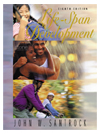 |  Life-Span Development, 8/e John W. Santrock,
University of Texas - Dallas
Late Adulthood Cognitive Development in Late Adulthood
Chapter ObjectivesI.Explain the multidimensional, multidirectional nature of change in cognitive functioning. |
 |  |  | II.Discuss the different types of memory, memory changes, and wisdom. |
 |  |  | III.Explain the relationship to cognitive functioning of education, work, and health. |
 |  |  | IV.Elaborate on the training of cognitive skills. |
 |  |  | V.Explain the work trends among older adults. |
 |  |  | VI.Discuss retirement in the United States and in other countries, including factors that aid adjustment to retirement. |
 |  |  | VII.Describe the nature of mental disorders in older adults, being sure to mention the predictors of and treatment for depression. |
 |  |  | VIII.Discuss the different types of dementia, including their causes, symptoms, and treatments. |
 |  |  | IX.Identify the effects of fear of victimization, crime, and elder maltreatment on older adults. |
 |  |  | X.Expound on ways in which society can meet the mental health needs of older adults. |
 |  |  | XI.Discuss the role of religion in late adulthood. |
|



 2002 McGraw-Hill Higher Education
2002 McGraw-Hill Higher Education